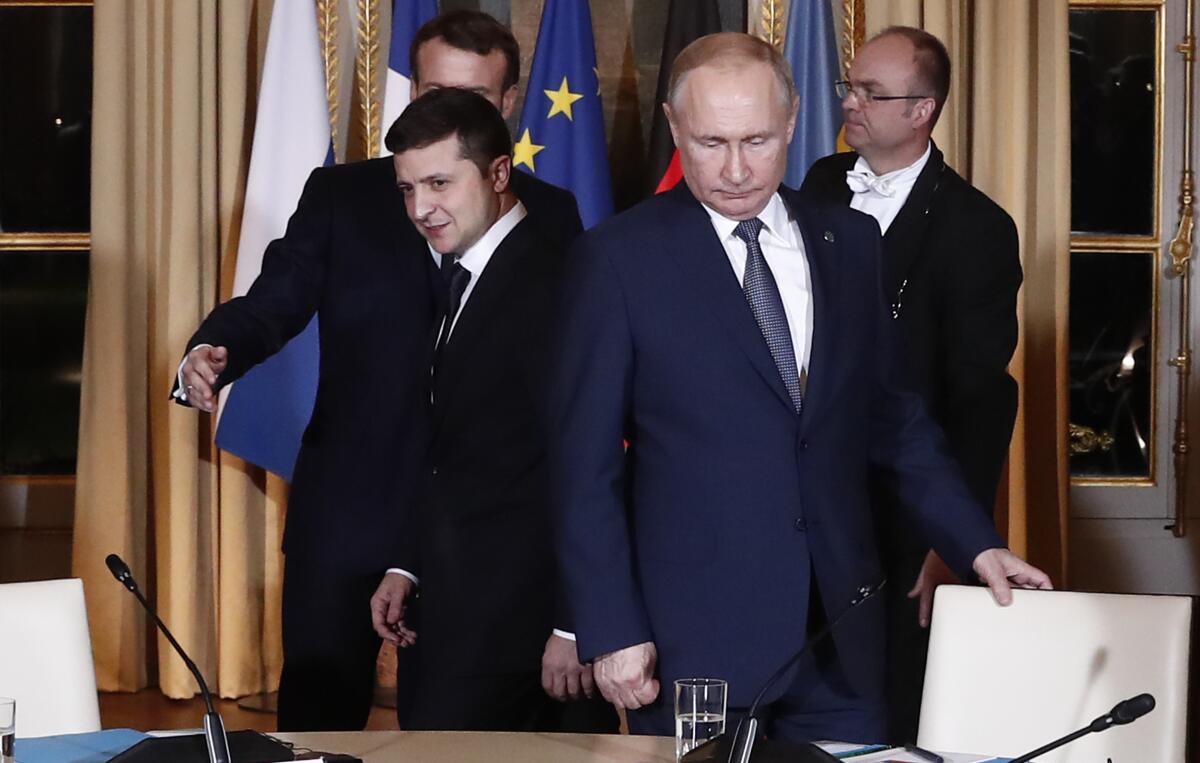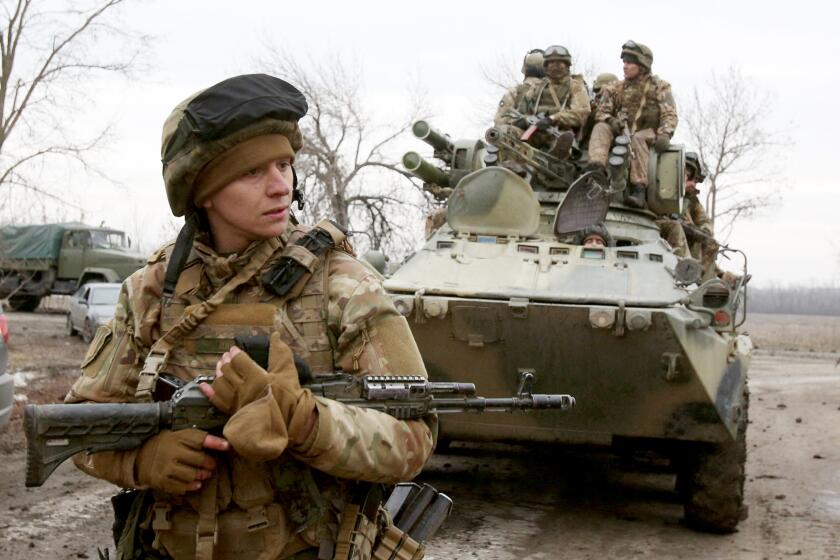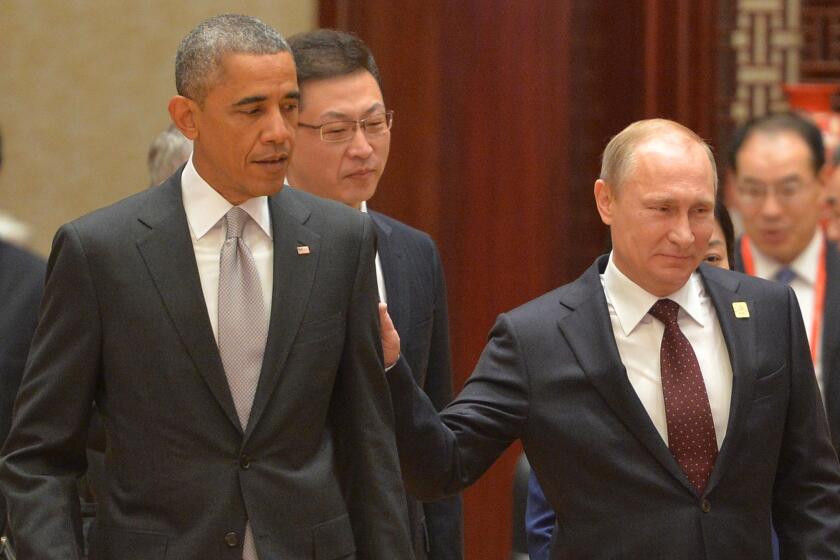Column: How Western sanctions may demolish Putinâs âFortress Russiaâ

For years, Vladimir Putin worked assiduously to strengthen what was known as âFortress Russia,â reducing its government debt and building up its reserves of gold and foreign currency as a bulwark against political and economic challenges.
Over the last few days, Fortress Russia has begun to crumble. What looked impregnable up to the moment that Russia launched its invasion of Ukraine on Feb. 24 now appears to resemble a Potemkin Village, a reference to the fake settlements purportedly erected to deceive Catherine the Great about the vibrancy of her domain in the 1780s.
In the most significant of international sanctions imposed on the aggressor, the Russian central bank has been blocked from accessing more than $400 billion in foreign reserves held abroad as bank deposits and securities holdings â a massive portion of the $630 billion in foreign reserves accumulated under Putinâs leadership.
Russia has money, it just canât access or spend it.
— Robert Person, U.S. Military Academy
Russia holds roughly an additional $132 billion in gold domestically, but monetizing that hoard will be extremely difficult amid financial restrictions placed on the central bank and the countryâs largest commercial banks.
In practical terms, the restrictions mean that Russia has lost most of its ability to defend the ruble from its ongoing collapse, buy goods abroad or domestically, or pay its debts.
Get the latest from Michael Hiltzik
Commentary on economics and more from a Pulitzer Prize winner.
You may occasionally receive promotional content from the Los Angeles Times.
âRussia wonât be able to convert those funds into rubles to counteract the massive sell-off weâre seeing today,â says Robert Person, professor of international relations at the U.S. Military Academy at West Point.
âAnd because theyâre frozen, they canât repatriate those funds and spend them domestically to support the economy or fund the war,â says Person, who emphasizes that he is speaking personally, not on behalf of the U.S. government. âRussia has money; it just canât access or spend it.â
The real-world consequences have become evident in recent days. Long lines of depositors materialized at the doors of Russian banks, as citizens rushed to withdraw their funds before the banks run out of currency.
Sanctions have been known to bring about political change. But Russia is larger and more economically integrated with its neighbors than previous targets.
The value of the ruble has deteriorated by the hour, falling as low as 110 to the U.S. dollar from about 82 just prior to the invasion â making it harder for Russians to buy foreign goods and raising the specter of hyperinflation. Standard & Poorâs slashed the rating of Russian government bonds to âjunkâ status, with other credit-rating agencies poised to follow suit.
The Russian central bank more than doubled benchmark interest rates to 20% in an effort to lure deposits back into its financial system. But with restrictions being placed by the U.S., the European Union and other sovereign entities, even traditionally neutral Switzerland, on trading with Russia, itâs unclear where those deposits could come from.
Sanctions on the Russian government and on the nationâs financial plutocrats, or oligarchs, were hinted at in the run-up to the invasion of Ukraine, and then were implemented in steps after tanks crossed the Ukraine border and shelling began.
Putinâs personal assets held abroad have been frozen, as have those of top ministers, hundreds of members of the Duma, or Russian legislative body, and leading financial figures. Some, though not Putin, have also been banned from traveling to European countries. The U.S. has cut off Sberbank, Russiaâs largest bank, from the U.S. financial system and frozen the assets of VTB, the second-largest bank. Other banks face lesser restrictions.
The U.S. has barred some of Russiaâs biggest private and state-owned companies from raising funds in the U.S. market, including Gazprom, the worldâs largest gas company; Gazprom Neft, among its largest oil producers; and its largest shipping and railroad companies. State-owned companies are banned from listing shares on EU stock markets.
The U.S. has blocked the export of high-tech products such as computers and computer chips to Russia.
The U.S. and other major countries have disconnected leading Russian financial institutions from SWIFT, the acronym for the Society for Worldwide Interbank Financial Telecommunication. The cutoff will have a chilling effect on Russian transactions, because communications over SWIFT allow the speedy and efficient conclusion of those transactions, but technically wouldnât block them outright.
In certain corners of conservative thought, itâs been fashionable to portray Russian President Vladimir Putin as a master strategist who has outdueled Barack Obama at every turn.
By far the most significant international sanction is the freezing of the Russian central bankâs assets abroad. Thatâs genuinely a hammer blow â and one that stunned international trade experts with its scale and the rapidity with which it came together.
âGoing after the central bank is a huge step,â Daniel Fried, a former U.S. ambassador to Poland and currently a fellow at the Atlantic Council, said during a council roundtable discussion Saturday. âWeâre in a new place. This is economic cold war against Putinâs Russia, which is entirely deserved.â
âThis is truly a historic set of actions by the Western allies,â says Daniel Glaser, a former U.S. Treasury official specializing in terrorism financing and financial crimes. âIâve been involved in this area for more than 20 years, and itâs taken us a week to do what took us five years to ramp up against Iranâ starting in the 1990s.
What makes the severe sanctions so extraordinary, Glaser told me, is that theyâre directed not at a modest-size country like Iran, but a developed nation that is a member of the G20, or Group of 20 developed countries. âWhatâs significant is that this is a coordinated and quite overt attack on Russiaâs reserves.â
Through the postwar years, major national economies became more integrated and interrelated. âGlobalizationâ was not always seen as a global boon. For Putin, however, it was an indispensable brick in Fortress Russia â he purposely strove to make foreign economies, especially in Western Europe, more dependent on Russia, chiefly through its exports of oil and natural gas.
Now and for the first time, however, global interdependence has been weaponized for geopolitical purposes. âWeâre seeing the advantage of globalization,â says Richard M. Nephew, a sanctions expert at Columbia University. âWeâre saying, âYes, youâre in our system, but weâre also in yours.â â
Putinâs efforts to inoculate Russia against sanctions included using revenues from oil and gas sales â the nationâs leading exports â to rapidly pay down the countryâs international debt to the point that it amounted to less than 18% of its gross domestic product, making it one of the least indebted countries in the world, by Personâs reckoning.
Meanwhile, Putin assiduously built up Russiaâs foreign exchange holdings, increasing them by more than 36% since the end of 2018.
Russia has the capacity to circumvent or blunt some sanctions. Oil and gas sales are still permitted under the sanctions regime, at least through the end of June â a loophole that may reflect the need for European buyers to obtain supplies of oil and gas through the winter and spring.
Russia could also try to evade some sanctions with the cooperation of China, one country that has not overtly joined the sanctions drive. Russia holds about $84 billion in Chinese government bonds, according to Person, but they can be converted only into Chinese currency and, therefore, spent only on Chinese goods.
Are the Sochi Olympics heading for disaster?
But Putin may not relish tying his countryâs fortunes closer to China.
âIf Russia wants to turn itself into a vassal to China,â Glaser says, âIâm sure the Chinese would be happy to dictate terms to them. But I donât think China will be particularly interested in saving Russia from the West.â
The key imponderable in the sanctioning of Russia may be how long the coordinated financial attack can hold. One issue is what Russia can do that would prompt the West to rescind the restrictions. A withdrawal of troops from Ukraine certainly would be necessary, but whether any but the most stringent sanctions would be removed as long as Putin remains the Russian president is uncertain.
Another unknown is what impact the Russian sanctions will have on the rest of the world. âItâs almost inevitable that this type of disruption in the international economy is going to have unattractive consequences worldwide,â Glaser says.
âThese actions are not cost-free to the West,â he told me. âBut when you compare the devastating impact youâre already seeing in the Russian economy to the mild and longer-term impact on the global economy, itâs almost like comparing apples and oranges.â
More to Read
Get the latest from Michael Hiltzik
Commentary on economics and more from a Pulitzer Prize winner.
You may occasionally receive promotional content from the Los Angeles Times.














